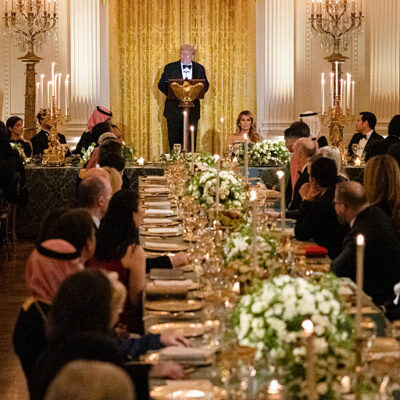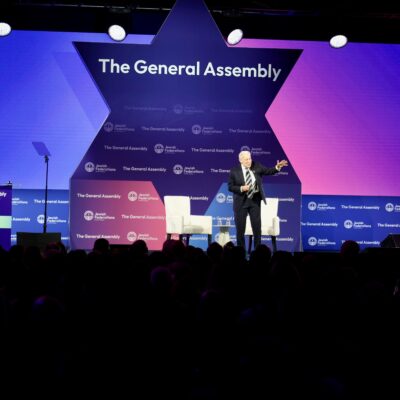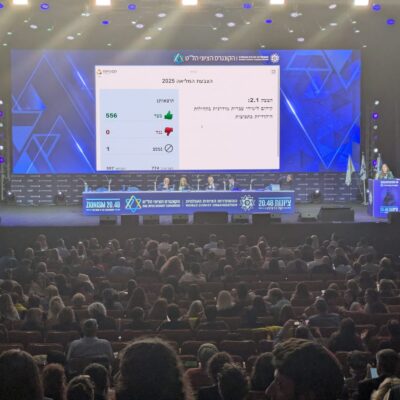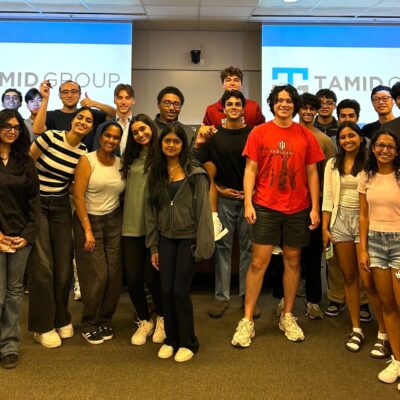WHAT YOU SHOULD KNOW
What Jewish philanthropists dining with Saudi royalty says about U.S. Jewry’s political power
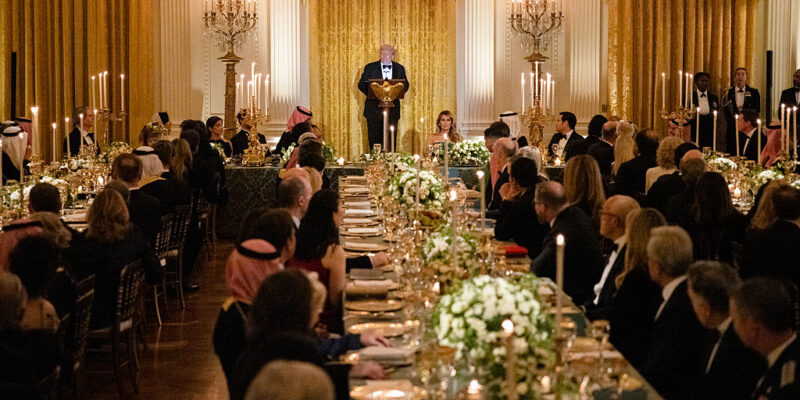
US President Donald Trump speaks during a dinner with Mohammed bin Salman, Saudi Arabia's crown prince, not pictured, in the East Room of the White House in Washington, DC, US, on Tuesday, Nov. 18, 2025. Trump said the US would sell F-35 fighter jets to Saudi Arabia, offering Crown Prince Mohammed bin Salman a prize he's long cherished - even though many obstacles remain before he gets the stealthy planes. Photographer: Anna Rose Layden/Politico/Bloomberg via Getty Images
Among the dignitaries, diplomats, sports figures and tech moguls at last night’s black-tie dinner at the White House for Saudi Crown Prince Mohammed bin Salman were several prominent Jewish philanthropists, mingling with Saudi officials and business leaders.
They included: Blackstone CEO Stephen Schwarzman and wife, Christine Schwarzman; Washington Commanders owner Josh Harris and his wife, Marjorie Harris; Pershing Square founder Bill Ackman and his Israeli wife, former MIT professor Neri Oxman; Salesforce CEO Marc Benioff; Palantir CEO Alex Karp; Pfizer CEO Albert Bourla; and Paramount CEO David Ellison. They weren’t there because of their philanthropy, of course, but because they also happen to lead some of the most significant investment houses, technology firms and publicly traded companies in the world. But all of them have also donated millions of dollars, in some cases tens of millions, to Jewish and Israeli causes, particularly over the past two years.
Their inclusion at the gathering represents an opportunity to advance one of Israel’s and American Jewry’s most significant policy goals: normalization between Jerusalem and Riyadh. At the same time, it demonstrates the major shifts in American Jewish politics in recent decades, according to Chuck Freilich, a former Israeli deputy national security advisor and senior fellow at Harvard’s Kennedy School, who also teaches at Columbia University and Tel Aviv University.
Nearly 45 years ago, the United States was also preparing to sell top military technology to Saudi Arabia — the Airborne Warning and Control System (AWACS) — despite intense opposition from Israel, which saw it as a major threat to its air superiority. Though ultimately unsuccessful, the American Jewish communal world lobbied hard against it. While the sale went through, the effort ultimately resulted in a formal American pledge a year later by then-President Ronald Reagan to maintain Israel’s so-called qualitative military edge, which was later enshrined in law.
Now, there is another proposed American sale of military technology to the Saudis — the F-35 stealth fighter jet — yet the American Jewish response has been dramatically different. “AIPAC didn’t really put up a fight,” Freilich told eJewishPhilanthropy, adding that the proposed sale is largely seen as a fait accompli and the Jewish establishment does not believe that it has the clout to change that.
Of course, Freilich said, there are substantial differences in the underlying circumstances regarding the F-35 sale and the AWACS sale in 1981, when the Saudi government had a much more combative relationship with Israel. “We’re in a very different reality than in ‘81,” he said. “Israel has a relationship with the Saudis today. They’re not an enemy anymore.”
And yet, the Israeli military has warned that Saudi F-35s would potentially threaten its regional air superiority, and Freilich said that a more effective fight against the sale could have earned Israel greater concessions, either toward advancing normalization or for different military technology.
The American Jewish institutional power that was far more potent in 1981 has been supplanted by the influence of individual American Jews, including those in attendance at last night’s White House dinner. “For Jewish businesspeople to have connections with the Saudis is not only not problematic, they can be a bridge,” Freilich said.
However, Freilich warned that while they can have an influence on geopolitical events, these Jewish business leaders are inherently constrained and are not a sufficient substitute. “Sure, they have clout, but they need to use it judiciously,” he said. That is why American Jews need to have a “really strong lobby,” Freilich said. “They don’t have the power that they once did, and that’s a real problem.”

 Add EJP on Google
Add EJP on Google